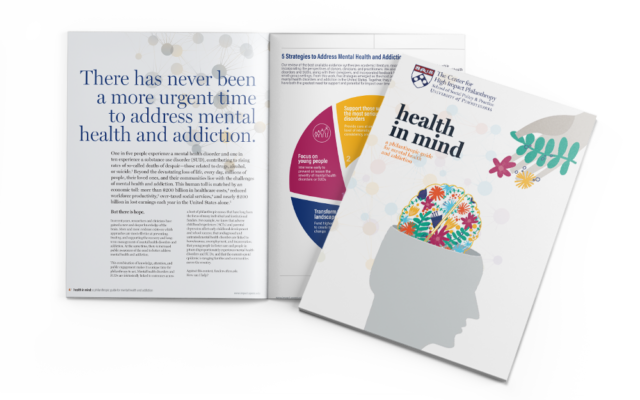From October 24 to 28, the American Public Health Association is hosting its first virtual Annual Meeting and Expo, featuring the 2020 theme of “Creating the Healthiest Nation: Preventing Violence.” APHA 2020 will bring together thousands of public health professionals for scientific programming, networking, poster sessions, and more.
This year, CHIP will co-host a session on October 27 from 12:30-2:00pm ET: Activating Partnerships for Impact: How Philanthropy & Cross-Sector Collaboration Can Advance Mental Health and Addiction Outcomes.
CHIP’s recently published Health in Mind: A Philanthropic Guide for Mental and Addiction highlighted four categories of philanthropic support: direct services, system capacity building, policy/advocacy, and research/innovation. These categories often reflect different levels of risk, timeframes for results, and social impact return profiles. All have potential for high impact. However, some funders may lack the expertise, patience, risk-tolerance, networks, or personal comfort level to invest in all categories. In addition, criteria for selecting ways to help and types of evidence for assessing progress differ among these categories.
Kat Rosqueta, Executive Director of CHIP, will give a brief overview of Health in Mind and a broad view of how philanthropy can help, then facilitate a panel of both local and national funders to speak about their experiences navigating funding in one or more of these categories. The panel will include: Kat Rosqueta, Founding Executive Director, Center for High Impact Philanthropy (Philadelphia, PA); Tyler Norris, Chief Executive Officer, Well Being Trust (Oakland, CA); Brandon Staglin, President, One Mind (Napa, CA); Kim Firth, Program Director, Endowment for Health (Concord, NH); Rick Kellar, President, Peg’s Foundation (Hudson, OH).
Following these presentations, Kat will moderate a discussion of the collaboration needed to achieve positive change in this important issue area. Each panelist will share how they are partnering with peer funders, researchers, practitioners, policymakers, and community members, with insight on how to replicate the deep multi-sectoral collaboration they are fostering to drive greater impact beyond direct grantmaking. The panel discussion will conclude with an open Q&A session that focuses on unlocking opportunities to foster greater collaboration with and amongst philanthropic funders. Both funders and grantees attending APHA’s Annual Meeting will gain insight into tools and strategies developed for multi-sectoral collaboration to achieve a common goal of addressing mental health and addiction. Learn more about APHA 2020 here >>


